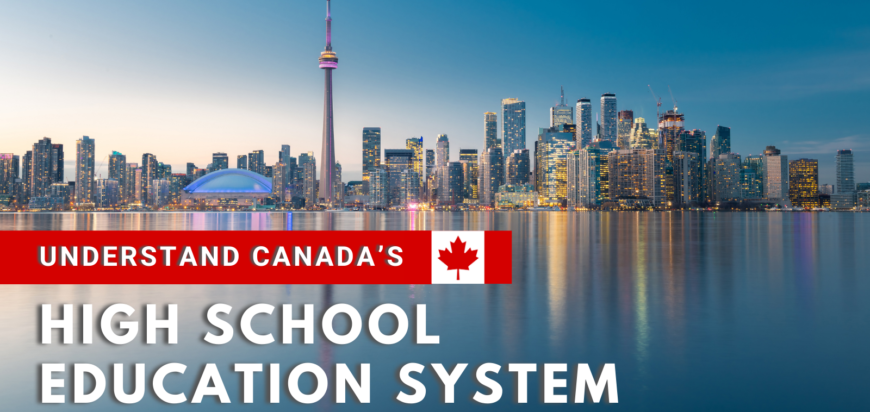More and more Cambodian students start to apply for high schools in Canada for one reason or another. No matter what, not many Cambodian students are fully aware of Canada’s high school education system and what it can offer to foreign and Cambodian students. Here, we are going to discuss the key seven areas which foreign and Cambodian students can experience from attending high schools in Canada as a part of Canada’s high school education system.
- Ranking and Standard
The country is one of the best, according to the Organisation for Economic Co-operation and Development or OECD. According to its survey, Canada’s high-school institution was ranked 6th in reading, 12th in math and 8th in science. Besides, Canada’s high-school diploma is recognized across the world.
Education standard in Canada is promised by the state especially the provincial level. Secondary education starts from grade 9 to grade 12 at almost all public high schools. Ontario offers a grade 12+. Besides, students attend schools until the age of 16 in Quebec. Students, therefore, may pursue CEGEP which is a two-year college education that students can undertake to obtain a vocational diploma or university preparation diploma.
- Public School
More than 95% of Canadians choose public schools for their children’s education. There is a reason that makes public education in Canada ticked. Every public school in Canada follows a standardized curriculum, employs government-approved teachers, is provincially accredited and sustained by public funds. Therefore, the quality is promised by the state which you can be assured.
Meanwhile, there are not many private schools in Canada while there is no guarantee that private schools are as qualified as public schools because they are not sustained by the state’s funds. Besides, the curriculum at private schools might not be as standardized as the one at public schools.
- Campus Life
A typical day at a high school in Canada starts off at 8 am and ends at 3 pm which you will need to attend classes from Monday to Friday. There are cases that you need to attend a summer school as well if students don’t happen to finish a course during the school year. Besides, the school campus is modern relative to Cambodia when it offers various facilities ranging from gymnasium and sports courts to laboratory and other facilities.
A collaborative and friendly learning environment is offered for foreign and Cambodian students. Students attending high schools in Canada are welcome to interact with local students as Canada is prestigious for its culture of embracing immigration. Cambodian students, as a result, can find no trouble making friends with local and other international students.
- Teachers’ Qualifications
Teachers at public high schools in Canada need to have at least a Bachelor’s degree with one year of practical teaching training. Teachers are also encouraged to pursue Master’s degrees and post-graduate certificates to improvise their skills and knowledge. As a rule of thumb, teachers in Canada are routinely challenged to upgrade their skills and knowledge as well.
Cambodian students can become clearer once they attend public high schools in Canada because of the innovative teaching approach teachers offer to their students. Lessons are thus brought alive for students with innovative approaches, real-world opportunities and technology. Students are offered the best teachers because Canada champions education and offers higher than average salaries for teachers. As can be seen, a teacher’s salary in Canada is higher than Canada’s GDP Per Capita and the average salary of a teacher in other OECD countries. This could be a source to attract talented individuals to become teachers.
- Curriculum
As a basic, students attend classes such as technology, arts, math, science, language, history, geography and economics. However, students can attend other classes to their preferences ranging from astronaut, pre-university math, environmental studies, international business and robotics.
Specialized programmes are also offered at many high schools. Those programmes are such as outdoor education, health sciences, international affairs, laws, engineering and entrepreneurship. The specialized programmes aim to prepare students for undergraduate education in one specialized major or another.
- Sports and Extra-Curricular Activities
Cambodian students can participate in various extra-curricular activities including wrestling, volleyball, debate club and musical theatre. It is special if you are a sporty person because every public high school has a sport team which you can be a part of. Meanwhile, students can participate in a school band or write for their schools’ newspaper, or you can attend the school’s cooking class. A school, in Canada, is in fact a cultural hub for the surrounding communities.
There are other extra-curricular activities taking place during the school year including spending a week attending university classes, a tour visit to the technology and science museum, a trip to Quebec to explore French-Canadian culture or an overnight outdoor adventure. These activities are all fun activities which we are sure Cambodian students would much enjoy.
- Cost of Living and Tuition Fee
Cambodian parents who plan to send their children for secondary education in Canada should budget between 9, 000 and 15, 000 US dollars per semester for their children’s education which is the typical fee for high school in Canada.
The cost of living including accommodation, food and transportation service can range from 800 US dollars to 850 US dollars.
What Should You Get from the Article?
In the article, Cambodian students get to understand Canada’s secondary and public education more with areas such as ranking and standard, public school, campus life, teacher’s qualifications, curriculum, sports and extra-curricular activities as well as the cost of living and tuition fee.
If you are interested to attend high schools in Canada, feel free to seek consultations for free from us WEduAbroad. You may visit WEduAbroad the Cambodia-based consultancy for study abroad at the 7th Floor, B-Ray Tower, Preah Norodom Blvd, Tonle Bassak Commune, Chamkamorn District, Phnom Penh (map here) or make a call to 017 548 354 | 081 63 63 60. We also have a Facebook page at www.facebook.com/WEduAbroad/.







